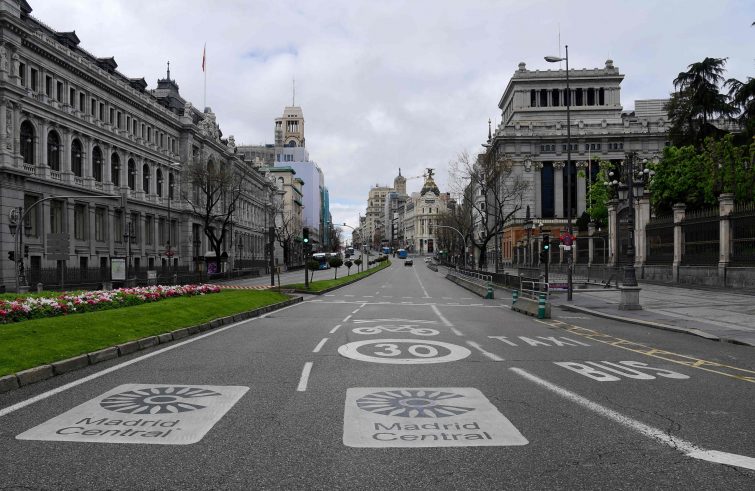
Coronavirus Covid-19: Italy recorded the highest death toll in Europe, while Spain claimed the highest number of infections. On April 5, while Italy counted 128,948 total cases, 21,815 recovered and 15,887 dead, in Spain on the same date (but figures refer to the last finding at 9 p.m. on April 4) there were 130,759 cases, 12,418 dead and 38,080 recovered. In addition to the extent of the epidemic, the two countries have in common a widespread presence of the Church that assures her closeness to those who are suffering, with the creativity of love called for by Pope Francis. Over three hundred – at the moment, but growing day by day – ecclesial initiatives in Spain’s 70 dioceses are responding to pastoral, spiritual, social, welfare, educational and entertainment needs in this time of isolation. On the occasion of Palm Sunday and the beginning of Holy Week, the Executive Commission of the Spanish Episcopal Conferenceaddressed a message “of encouragement and hope” to all people, inviting the faithful to “confidently turn to God.”
In “this unsettling time, that no one was prepared for”, the Spanish bishops highlighted a positive aspect: “Amidst the ordeal caused by this situation,
we are seeing many episodes of holiness and various examples of dedication and heroism.
showing that human beings have the ability to overcome great challenges by serving others with love, generosity, strength and sacrifice”. At the same time, the bishops recognize and appreciate “the generous dedication of health workers who are wholly committed to the medical and human care of the sick, as well as in research groups to find solutions to the pandemic. We hereby express our closeness and support to the elderly and those living in nursing homes. To them, guardians of our wisdom and history, we owe everything in our lives and it is time to reciprocate all their sacrifice and their love.”
In their message, the prelates also express their gratitude to priests, deacons, consecrated persons and lay people for their pastoral dedication, celebrating the Eucharist, caring for families and people living alone, accompanying the sick; as do the monasteries of contemplative life which keep the flame of hope alive with their prayers.
In particular, they commend “the tireless efforts of priests and pastoral workers attending to these difficult moments and supporting mourning families with Christian hope” in cemeteries and hospitals.
Their recognition also goes to all the families and workers in all sectors “who make it possible for our life to go on”: the bishops of the Executive Commission share their concern for the most vulnerable, poor and at risk of exclusion” for whom they request the support of “benefactors, collaborators and volunteers”, while at the same time thanking them for what they have already done. The prelates remark that Covid-19 has caused “a great economic, labour and social wound” in Spain highlighting the need for “sustained efforts to alleviate the consequences of this pandemic that causes suffering and poverty. An ever closer collaboration between the public and private sectors, between civil and religious institutions, will be needed more than ever to overcome this crisis.
We call for an alliance of the whole of society and its institutions in support of this great common project”,
for which ” we offer our human and material resources to meet this challenge. Together we can overcome it and envision the future with hope”.
The Spanish Church called upon the faithful to live the Holy Week in solidarity with those most affected by the pandemic. The celebration of the Day of Fraternal Love, Holy Thursday, “is a privileged moment” to “live out a spirit of fraternity and give concrete form to the new commandment of love.”
In particular, Caritas and the Episcopal Conference, with the slogan ” Fraternity illuminates hope” propose to light a candle when sharing dinner on Holy Thursday, accompanied by a prayer/ blessing.
“At a time when, due to isolation, we can celebrate the Eucharist only in digital form, this gesture will help us to feel, if possible, more united, more in communion with everyone and with all suffering humanity in this global pandemic. Solidarity with people affected by the impact of the coronavirus can be expressed on the Day of Fraternal Love through financial support to the emergency campaign “Every gesture counts” launched by Caritas for the most urgent needs of the most disadvantaged.
All 70 diocesan Caritas in Spain and each of the dioceses are working on a number of solidarity initiatives, with the slogan
“Charity does not shut down”
to support the basic needs of people in severe distress, such as the homeless, the elderly, or families with limited resources. The effects of Covid-19 on the economic and social circumstances of the country are very strong and evidence suggests that, due to the growing employment crisis and the lack of income that hundreds of thousands of families are already facing, there will be an increasing demand for urgent support. In this scenario, Caritas’ efforts will be directed to the needs of the most vulnerable groups.
Spanish dioceses have put in place over three hundred initiatives that range from online celebrations to the offer of diocesan structures and buildings to assist people affected by Covid-19 or health care workers; from the creation of face masks to donations of respirators in hospitals; from programs providing assistance to the elderly and fragile people to support to migrants; from the offering of Masses for the deceased to psychological and spiritual counsel by phone; from letters of encouragement to hospital patients to messages to prisoners; from live online concerts to the digital Stations of the Cross for young people; from virtual visits to cathedrals or churches to playful and educational activities at home; from prayers via Whatsapp to soup kitchens and delivery of medicines to homeless people.











